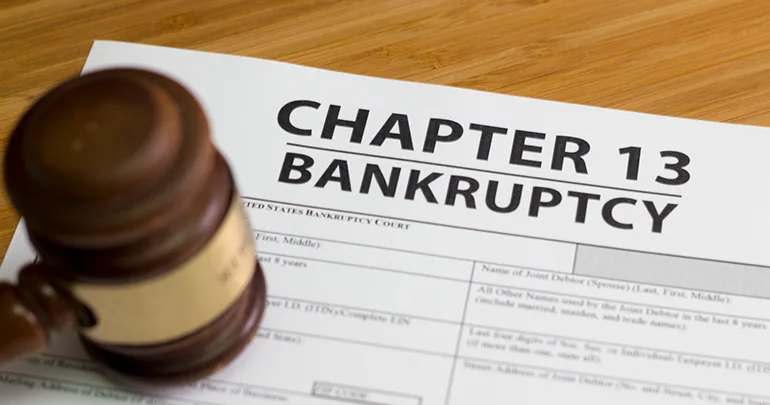
Navigating Financial Challenges: Exploring Title Loans During Chapter 13 Bankruptcy.
August 15, 2024
Understanding Chapter 13 Bankruptcy: A Reorganization Plan.
When facing mounting debts, individuals with a steady income may opt for Chapter 13 bankruptcy, also known as the "wage earner's plan." This legal process allows debtors to reorganize their financial obligations through a structured repayment strategy spanning three to five years. The primary objective is to regain financial stability by restructuring debts manageably, thereby avoiding the loss of assets.
The Impact of Chapter 13 on Car Title Loans.
Filing for Chapter 13 bankruptcy significantly influences your ability to obtain a car title loan, given the intricate details involved. Let's delve deeper into the specifics:
Applying for a New Title Loan.
During an active Chapter 13 bankruptcy, securing approval from the appointed bankruptcy trustee is mandatory before applying for a car title loan. These trustees are responsible for safeguarding the interests of debtors and creditors, ensuring the legality of the bankruptcy proceedings. Consequently, they may deny your request for a title loan if it is deemed an unwise financial decision.
Existing Title Loan Obligations.
If you already have an outstanding title loan, Chapter 13 bankruptcy allows you to incorporate this debt into the restructured repayment plan. This arrangement offers two options:
Moreover, the restructured plan may include a lower interest rate and a reduced principal balance, making the repayment more manageable. You must make specific monthly title loan payments based on the agreed-upon terms. Any remaining debt after the repayment period may sometimes be discharged.
Securing a Title Loan After Bankruptcy.
Once your bankruptcy has been discharged, trustees no longer have authority over your financial decisions. You can apply for a title loan by following a straightforward process to provide swift financial relief. While your bankruptcy record will be reviewed, the primary factors for loan approval are your steady income and the equity in your vehicle.
A Three-Step Process.
Requirements for Securing a Title Loan After Bankruptcy.
To ensure a smooth loan approval process and access the funds you need promptly, have the following documents ready:
Loan Approval and Disbursement
After the inspection, the lender reviews your application and approves the loan. The funds are then disbursed quickly, often within the same day. This rapid turnaround is a hallmark of auto title loans, making them ideal solutions for those seeking immediate financial assistance.
Consulting a Bankruptcy Attorney: A Wise Decision.
When considering bankruptcy, seeking guidance from an experienced bankruptcy attorney is highly recommended. Being transparent about your assets, liabilities, and any existing car title loan debts is crucial. An attorney can provide valuable insights, recommend the most suitable bankruptcy option based on your unique circumstances, and guide you through filing.
Misleading information can lead to undesirable consequences, such as case dismissal, fines, imprisonment, or loss of court-provided protection for bankrupt individuals.
Frequently Asked Questions.
Can I Apply for Personal Loans While in Chapter 13?
Yes, obtaining a personal loan while making repayments under a Chapter 13 bankruptcy plan is possible. However, the impact of bankruptcy on your credit score may make qualifying for a loan challenging. If you qualify, you will still need to seek approval from the bankruptcy court.
Can I Keep My Car Without Filing for Bankruptcy?
Absolutely. Making timely monthly payments allows you to retain ownership of your car without filing for bankruptcy. However, missing payments increases the risk of the car title lender repossessing your vehicle. If you're struggling to make payments, you should communicate with your lenders and request an extension or a more favorable repayment plan.
Can I File Bankruptcy on a Title Loan?
Yes, you can file for bankruptcy on a title loan. However, the title loan debt treatment will depend on the type of bankruptcy you file. For instance, if you file for Chapter 13 bankruptcy, you can reorganize your debt to make it more affordable.
What Happens If You Apply for Credit During Chapter 13?
Applying for credit during an active Chapter 13 bankruptcy requires permission from the bankruptcy trustee or judge. Violating this requirement is considered a breach of bankruptcy laws. It may result in the rejection of your credit application, immediate dismissal of your bankruptcy case, potential fines, penalties, or other legal actions.
How Long Does It Take to Get Credit After Chapter 13?
Chapter 13 bankruptcy will remain on your credit report for seven years from the filing date, and it is not discharged until after the repayment of debts. Consequently, your chances of obtaining traditional credit or loans during this period are slim.
Conclusion: A Fresh Start Awaits
While the bankruptcy court does not permit obtaining a title loan during an active Chapter 13 bankruptcy, there is hope for a fresh financial start once you have completed the repayment plan. At that point, you can apply for a title loan, and Credexwill be ready to welcome your application with open arms, potentially approving if you meet the eligibility criteria.If you have been discharged from bankruptcy and need a loan, feel free to complete our simple online applicationCredex. If you're unsure about your eligibility for a title loan, don't hesitate to contact us. We're here to provide clarity and assist you in navigating your financial journey.

